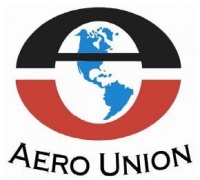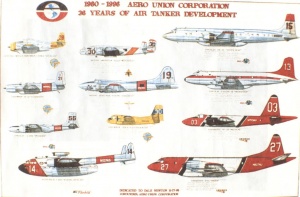Aero Union
Back to Civilian Operators
| Aero Union | |||
|---|---|---|---|
| Type: Private Company | |||
| Active: 1961-2011 | |||
| Founder: Dale Newton & Dick Foy | |||
| Headquarters: Chico, CA | |||
| Business: Air Tankers (USFS) | |||
| Employess: 100-150 | |||
The Aero Union Corporation was primarily operated in Chico, CA. They performed aircraft maintenance and operations, but were best known for aerial firefighting. Within the aerial firefighting industry they became well known as a firefighter training company, and as a manufacturer of custom equipment designed for specific airframes. The company was beleaguered by safety concerns and eventually the United States Forest Service cancelled the contract, which forced the company to close in 2011.
History
The history of Aero Union traces back to Redding, CA in 1960 when friends Dale Newton and Dick Foy climbed aboard a surplus B-25 Mitchell and fought their first aerial fire in 1960. They quickly formed a company called Western Air Industries. In 1961 they purchased 2 B-17 Flying Fortresses and changed the company name to Aero Union. In 1962 Dale and Dick moved the fledgling company from Redding, CA to Chico, CA.
Over the years the company grew and added many more planes to their air fleet. By June of 2010 the company made the decision to leave their base in Chico. Their new headquarters would be McLellan Airfield (formerly McLellan AFB). Numerous reasons were given for the move, primarily to have access to larger facilities and to be closer to their primary customers. The company began the transition in September of 2010, but closed down before the transfer was complete.
Airtanker scandal
Aero Union, along with 5 other US Forest Service aerial firefighting contractors, found themselves at the center of a scandal in the late 1980s. For much of the 1980s the C-119 Boxcar was a staple fire tanker plane for several companies, including Aero Union. But these planes were aging and in 1987 they were grounded by the FAA amid safety concerns. This led to a serious decrease in the USFS's firefighting capabilities. In response the USFS orchestrated a deal with the Department of Defense to exchange the stricken planes for newer P-3 Orion and C-130A Hercules aircraft. In total, 28 planes were exchanged under this program at no cost to the contractors.
This exchange program was done in secret without public knowledge. Once the public became aware of the program, a public outcry occurred with opponents of the program arguing that the clandestine way in which the trades were carried out in secret and at no cost amounted to cronyism because it denied the general public the right to bid on the surplus military planes at auction. Opponents also argued that if the USFS was so desperate to get planes, instead of giving the planes away for free it should have exercised the interagency agreement and allowed the contractors to fly the planes while the government still retained ownership of them.
During the investigation of this program it was discovered that Aero Union and TBM, another firefighting contractor, dismantled at least 4 of the planes they had acquired through the program and sold them off as parts. This led to further scrutiny, which uncovered that this was not the first time Aero Union had done this. They had previously exchanged planes with the USFS, but in those cases the government retained ownership and title of the planes and Aero Union was authorized to operate them. Despite this, Aero Union dismantled some of the government-owned planes and sold the parts for profit. Aero Union made an out of court settlement with the government over its actions but this was later challenged in court.
Closure
In April 2011 Aero Union had voluntarily disclosed that its planes were not current on inspections and were in violation of the contract. The contract, worth about $30 million a year, made up about 95% of the company's income. On July 29, 2011 the U.S. Forest Service announced that it had canceled its six-plane contract with Aero Union after the company's planes failed their required safety inspections. Less than a month later Aero Union informed its employees that they were out of work and that the company was shutting down operations. That August Aero Union failed to make its lease payments to the City of Chico and the lease was declared invalid by the city that September due to concerns that the city would be unable to re-lease the facilities if they became tied up in bankruptcy proceedings. Reduced to a staff of 5 people after the last round of layoffs, down from approximately 230 in 2008, CEO Brett Gourley claimed “The company is in sort of hibernation mode” and was looking for other sources of income. Aero Union has since completely shutdown all of its facilities, websites and other points of contact and is assumed to be out of business. In February 2012 PMI held an auction of Aero Union's aircraft assets, including 8 P-3 Orion aircraft, various spare parts and their intellectual property (MAFFS II and FIREHAWK firefighting systems). Only two aircraft were bid upon and those bids were rejected as being too low. In May 2012 another auction of tools and equipment, but no aircraft, parts or intellectual property, went through with the majority of it selling. Former Aero Union Tanker 23 was acquired by Airstrike Firefighters, with plans for 6 more P-3's.
MAFFS II
One of the company's last projects was an improved version of the Modular Airborne FireFighting System (MAFFS) under contract to the USFS. Originally designed for C-130J model aircraft and later modified to fit on C-130H models, the new MAFFS II system has a capacity of up to 3,400 gallons, replacing the five retardant tanks with one large tank, and has an on-board air compressor. The original MAFFS has to be pressurized by a compressor on the ground as a part of the loading process. The ability to pressurize the system in the air will cut turn-around time but yet, add substantial weight. The new system discharges the retardant through a special plug in the paratroop drop door on the side of the aircraft, rather than requiring the cargo ramp door to be opened; this allows the aircraft to remain pressurized during the drop sequence.
Aero Union delivered the first production unit to the USFS in July, 2007, with flight testing that following August. MAFFS II was used for the first time on a fire in July 2010.
Aircraft fleet
Types of planes operated by Aero Union:
- Lockheed P-3 Orion
- Lockheed P-2 Neptune
- Douglas DC-4/C-54
- North American Aviation B-25 Mitchell
- Boeing B-17 Flying Fortress
- Grumman S-2 Tracker
- Douglas A-26 Invader
- Grumman TBM Avenger
- Grumman AF-2S Guardian
- Fairchild C-119 Flying Boxcar
- Douglas DC-6
- Douglas DC-7
- Aero Spacelines Mini Guppy
List of Aero Union Invaders
Although Aero Union has 8 Invaders on their records, almost half of those were in inventory for less than a year. Only half of these Invaders were operated as firebombers for any significant length of time.
| Tanker # | USAF S/N | Delivered | SOC | Comments |
|---|---|---|---|---|
| 55 | 44-35323 | 1969 | 1972 | Acquired from Aeroflight, Inc out of Troutdale, OR. Aero Union bought the plane in 1969, but Conair owned it in May 1970, and Aero Union bought it back. The period between 1972 and 1977 is not known, but by 1977 it was registered with a new owner. |
| 56 | 43-22511 | 1970 | 4 May 1971 | Crashed and destroyed during firebombing efforts in Springerville, AZ 4 May 1971. |
| Unknown | 44-34535 | 1963 | 1965 | Bought from Hamilton Aircraft in Tucson, 1963. Sold to Aero Associates in Tucson, 1965. |
| Unknown | 41-39359 | 1966 | 1970 | Purchased from USAF surplus, 1966. Sold to Conair, 1970. |
| Unknown | 43-22357 | 1970 | 1970 | Was only in service with Aero Union for a short time. Bought in 1969 from Hamilton Aircraft of Tucson. Sold to Conair in 1970. |
| Unknown | 44-34344 | 1972 | 1974 | Purchased from Ames Corp, 1972. Damaged after nosewheel collapse shortly after acquiring it. Stored as damaged in 1972. Broken up for scrap in 1974. |
| Unknown | 44-35456 | 1972 | 1972 | Bought from Western Contracting, 1972. Sold to Conair, 1972. |
| Unknown | 44-35440 | 1971 | 1971 | Bought from Rock Island Oil & Refining, 1971. Sold to Conair, 1971. |

